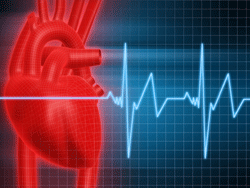The Awesome Foursome: Four Nutrients for a Heart Health

Cardiologist Dr. Stephen Sinatra has labels four nutrients – magnesium, coenzyme Q10, L-carnitine, and D-ribose – ‘the awesome foursome’ due to patient results linked to these nutrients.
These four nutrients are involved in the production of adenosine triphosphate (i.e. cellular energy). Adenosine triphosphate (ATP) is produced in the mitochondria of every cell. An ATP deficiency is linked to numerous health conditions, such as diabetes, Parkinson’s, cancer, heart failure, Alzheimer’s, and stroke.
These four nutrients can help boost the body’s production of ATP.
Heart Failure and Nutritient Deficiency
It’s important to know that heart failure may be linked to nutritional deficiencies. The right supplements can drastically improve your condition.
If you are diagnosed with heart failure here are four supplements to discuss with your doctor:
1. Coenyzme Q10
CoQ10 is a fat-soluble vitamin and powerful antioxidant. CoQ10 is directly involved in the production of energy and removes many free radicals from circulation. Free radicals lead to the oxidation of LDL and the subsequent chain of events that result in arterial plaque formation and narrowed arteries.
3 Foods to Lower Blood Pressure
Here are 3 foods containing nutrients that promote a lower blood pressure:
1. Sweet potatoes
Sweet potatoes are a rick source of potassium. Adequate potassium intake is essential to balance sodium and promote a lower blood pressure. The recommended ratio of potassium to sodium is 5:1. Increasing potassium intake can result in a blood pressure reduction of ~5 mm Hg systolic and ~2.5 mm Hg diastolic.
Heart Healthy Tips – 3 Key Minerals to Lower Blood Pressure
1. Reduce your SODIUM intake.
Too much sodium in your diet can contribute to high blood pressure and make your blood pressure treatment less effective. Simply reducing your sodium intake to 2.3 grams (6 g table salt) daily can decrease your blood pressure.
The average American consumes 6-18 grams of table salt daily (about 3 teaspoons). The body only needs 200 mg daily. That is 30 times less than what American’s typically consume.
To be heart healthy, sodium intake should be reduced to less than 2300 mg (1 teaspoon) daily.
Quick tips to cut back on sodium:
- Don’t add salt when boiling water.
- Leave the salt shaker off the table.
- Read food labels to avoid foods high in sodium.
- Avoid foods high in sodium, such as gravies, cheese, and soy sauces.
2. Increase your POTASSIUM intake.
Potassium works to balance out the sodium in your diet. An adequate potassium intake can lower systolic pressure ~4.4 mm Hg and diastolic pressure ~2.5 mm Hg.
Good potassium sources:
Cantaloupe, bananas, dates, nuts, oranges, and green leafy vegetables
Maintaining an adequate intake of potassium is especially important if you are taking diuretics. Some diuretics increase potassium loss via the kidneys.
3. Add more MAGNESIUM to your diet.
Research has shown an inverse relationship between magnesium and blood pressure. In other words, individuals with a high magnesium intake, typically have a low blood pressure.
Good sources of magnesium include:
Peas, beans, whole grains, nuts, seeds, lima beans, squash, broccoli, spinach, and seafood
Supplemental magnesium of ~500 mg can effectively lower blood pressure. Some studies have found magnesium supplements to reduce systolic blood pressure 2.7 mm Hg and diastolic 3.4 mm Hg. Discuss all supplements with your MD!
All the best,
Lisa Nelson RD
Heart Healthy Tips
Lower High Blood Pressure – How to Use Magnesium to Lower Blood Pressure

If you have high blood pressure, your MD has probably discussed with you sodium, potassium, and calcium as part of your treatment plan; however, the role of magnesium is often overlooked.
Magnesium is a critical player in maintaining normal blood pressure levels, as well as muscle and nerve function, blood sugar regulation, bone health, and immune system maintenance.
How Magnesium Regulates Blood Pressure
Magnesium is used in the production of prostaglandin E1, which is a powerful vasodilator. Typically, blood pressure rises as blood vessels harden and narrow, which causes the heart to exert increased force to circulate blood to body tissues. A vasodilator causes your blood vessels to relax and widen, allowing for easier blood flow and results in a lower blood pressure.
Magnesium also regulates the level of sodium, potassium, and calcium within cells. Sodium and potassium work together to maintain normal blood pressure levels and must be properly balanced. Too much sodium with too little potassium leads to high blood pressure, while the opposite – too little sodium with too much potassium – can result in low blood pressure. As far as calcium, individuals with adequate calcium levels tend to have lower blood pressures.
Research Findings
Research has shown an inverse relationship between magnesium and blood pressure. In other words, individuals with a high magnesium intake, typically have a low blood pressure. I’m not referring to supplements, but actual magnesium rich foods that provide 500-1000 mg of magnesium daily.
Supplemental magnesium of ~500 mg can effectively lower blood pressure. Some studies have found magnesium supplements to reduce systolic blood pressure 2.7 mm Hg and diastolic 3.4 mm Hg.
Magnesium Sources
Magnesium is readily available in foods, such as peas, beans, whole grains, nuts, seeds, lima beans, squash, broccoli, spinach, and seafood. Assess your diet for sources of magnesium and make adjustments to maximize your dietary intake of this mineral, and then determine if a magnesium supplement is needed. Magnesium is most effective when calcium and potassium levels are adequate. For the best results, make sure your intake of all three minerals – calcium, potassium, and magnesium – are at ideal levels and follow a low sodium diet.
Always speak with your MD about any supplements you take. Oftentimes, a basic multivitamin will meet your mineral needs without adverse interactions with medications. Steer clear of mega doses!
You’ll receive regular heart health and weight loss tips from dietitian Lisa Nelson when you sign up for The Heart of Health ezine along with the free report “Stop Wasting Money – Take Control of Your Health!” You may also be interested in the free e-course How to Lower Cholesterol in 8 Simple Steps.
All the best,
Lisa Nelson RD
What causes irregular heart beat? – Learn about heart disease.
 Here’s another question I asked Dr. Cynthia Shelby-Lane and her answer about causes irregular heart beat.
Here’s another question I asked Dr. Cynthia Shelby-Lane and her answer about causes irregular heart beat.
Lisa Nelson: What do you recommend for individuals experiencing heart palpitations and what may be triggering the problem?
Dr. Shelby-Lane: Arrhythmias are any deviations in the normal rhythm of the heart (heartbeat). They usually occur as a result of interference with the electrical pathways that produce the heart’s rhythmic muscular contractions. The Parasympathetic Nervous System is responsible for slowing down the heartbeat rate. The Beta-1 Adrenergic Receptors of the Beta-Adrenergic Nervous System are responsible for speeding up the heartbeat rate.
If you experience the following symptoms, you may need to be evaluated for toxicity and consider a stress test, echocardiogram, holter monitor or a tilt table test for further evaluation and diagnosis. A neurologic evaluation may also be indicated.
Fluttering or pounding in the heart
Hemodynamic disturbances are potentially life-threatening such as bradycardia and tachycardia
Dizziness
Syncope (fainting)
Unusual awareness of the heart
Anxiety
Abnormal ECG (provides a “one-shot” picture of the electrical activity of the heart)
Holter 24-hour monitoring results (Holter monitors look at the heart for a longer period of time and are necessary to detect intermittent rhythm problems.
Possible Causes Irregular Heart Beat, Contributing or Associated Factors
1. Coronary artery disease
2. Hypertension
3. Adverse drug reactions
4. Endocrine imbalances, especially thyroid or adrenal disorders
5. Myocardial tissue disease (valvular, atrial and ventricular abnormalities)
6. Sequela of rheumatic fever
7. Metabolic disorders
8. Nutritional deficiencies, especially magnesium
9. Caffeine
10. Environmental toxins or food allergies
11. Damaged conductive tissue (neurocardiogenic syncope)
12. toxicities
13. anxiety and stress disorders, etc.
Follow up diagnostic testing is recommended to determine if the above conditions are causing the problem.
Heart disturbances can occur as a symptom of magnesium deficiency: Measuring your red blood cell magnesium can give you a good idea of your actual magnesium level.
All the best,
Lisa Nelson RD
Heart Healthy Tips



